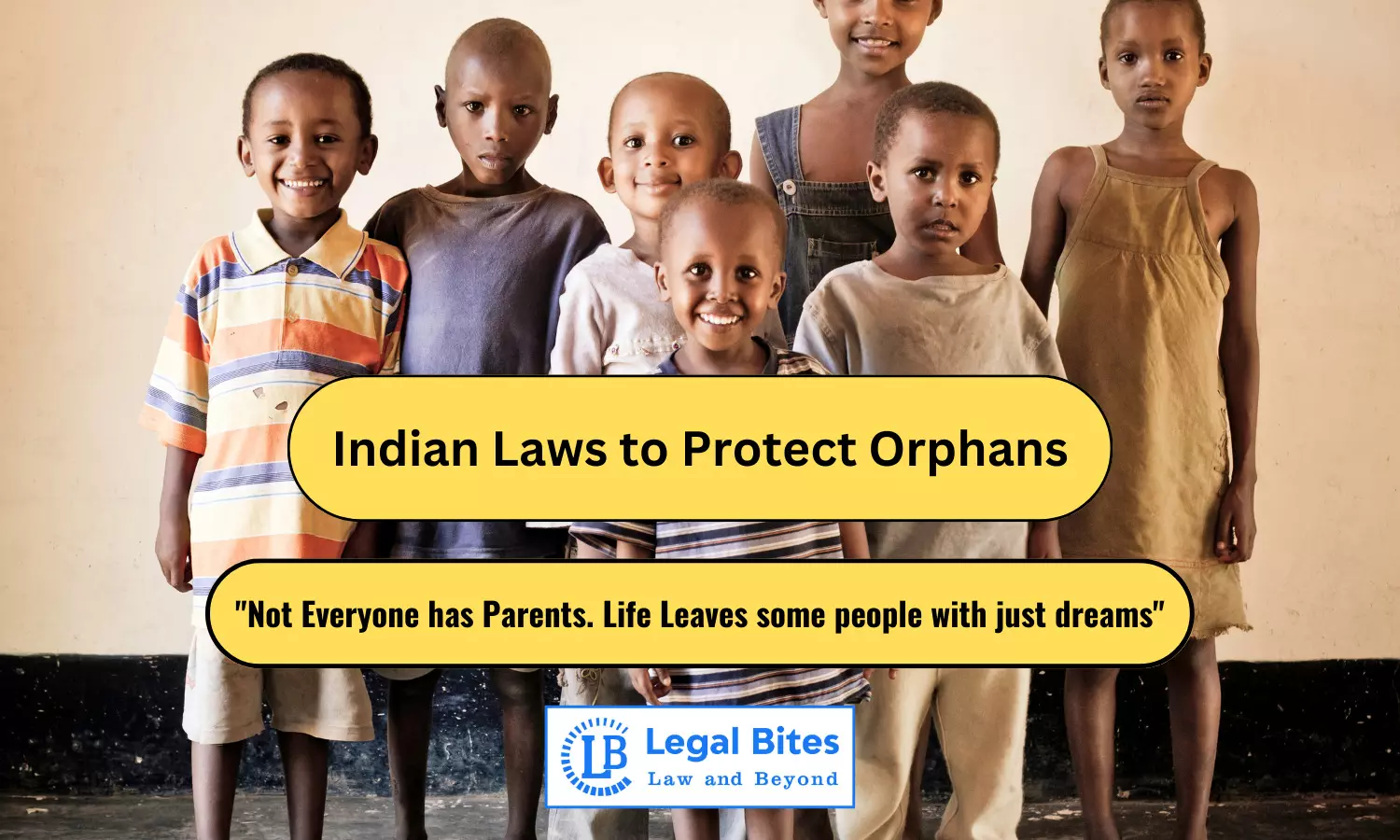Indian Laws to Protect Orphans
The article, ‘Indian Laws to protect orphans’ extensively covers the present legal scenario relating to orphans' legal rights, the laws governing the said subject matter and a comparison to the position relating to this in other countries.

The article 'Indian Laws to protect orphans' extensively covers the present legal scenario relating to orphans' legal rights, the laws governing the said subject matter and a comparison to the position relating to this in other countries. The author feels sorrow for the orphans and suggests that there is a sheer need to develop a single legislation for this issue so that those homeless can have homes for themselves and their families to live in.
Introduction
India, the second-most populated nation in the world, is home to many orphaned kids. Many children either lose their parents or are abandoned by their families in India as a result of the country's challenges with poverty, starvation, and corruption. According to UNICEF, around 25 million children were orphaned in India in 2007. India has experienced a sharp rise in the number of orphans after the Covid-19 pandemic began in 2020. Therefore, it is crucial to examine the current legal system in India that aims to safeguard orphans.
Indian orphanages have grown significantly throughout the years. Orphans used to be sold as slaves and exploited throughout the colonial era. These kids were taken away from their parents and made to work against their will. These youngsters were housed in orphanages that did exist but weren't always subject to strict regulations. Children were not being educated or having their basic needs met, and these circumstances raised grave worries.
Let us analyse the legal scenario relating to the same in more depth further.
Existing legal rights of Orphans
Following are some of the basic rights which every orphan must be guaranteed. These rights majorly include the right to education, right to life, protection from exploitation, right to health, and right to citizenship. Let us discuss them in detail:
a) Right to Education
All children between the ages of six and fourteen are guaranteed free education under Article 21-A. This places the burden of ensuring that orphans obtain a fundamental education on the state, just like other kids.
b) Right to Life
The protection of each person's life and freedom is guaranteed by Article 21 of the Indian constitution. Orphans would benefit from this because of how vulnerable they are. Their right to exist and use their freedom equally with everyone else is upheld by Article 21.
c) Protection from Exploitation
If an orphan is under the age of fourteen, their protection from trafficking, forced labour, and employment in dangerous regions is guaranteed by Articles 23 and 24 of the Indian Constitution.
d) Right to Health
The Right to health is included in the interpretation of Article 21. The right to decent physical and mental health belongs to every orphan kid.
e) Right to Citizenship
The right to citizenship is further explained in Part II of the Indian Constitution. Every orphan has the right to a legally recognised name and citizenship in any nation. Any state would defend their well-being as a result of this.
The Orphanages and Other Charitable Homes (Supervision and Control) Act, 1960
The Orphanages and Other Charitable Homes (Supervision and Control) Act, 1960 is one of India's most notable orphanage statutes. Through this decree, the state governments are given the authority to establish a Board of Control to oversee and manage all "homes" in that state and to put down specific guidelines for the Board's terms, membership, and duties. The Women's and Children's Institutions Act of 1956, which related to the provisions of this legislation, was repealed by this act, which came into force in 1960.
Powers and Functions of the Board of Control
These Boards are in charge of monitoring the efficient operation of all the homes in the state, conducting inspections, allocating funds, and resolving any issues with the homes in the proper manner. In addition, the Board of Control examines the legitimacy and legality of these existing homes, approves or rejects applications for such legality in the form of a certificate for a new home, and handles the revocation of said certificates in situations of management that are subpar in terms of the law and morality. However, individuals or groups that are adversely affected by the board's decision may always file an appeal with higher authorities, such as the State Government or the Court.
Other Relevant Laws and Statutes
i) The Juvenile Justice (Care and Protection of Children) Act, 2015
This law is about children and doesn't necessarily apply only to orphans. In accordance with orphanage laws, this law covers matters such as young children that require protection, nurturing, and care as well as their growth, education, treatment, and rehabilitation. This law addresses both offences done by and against children.
ii) The Immoral Traffic (Prevention) Act, 1956
This Act makes prostitution and trafficking illegal, including the operation of certain locations as brothels and subsisting on the proceeds of prostitution, but it exempts voluntary and unprompted prostitution. This Act is important because it safeguards orphans against prostitution and human trafficking.
iii) The Right of Children to Free and Compulsory Education Act, 2009
In relation to this topic, it largely focuses on the education of orphans. Established organisations that get funding from charities or the government to care for the kids in their care have a tendency to divert the money to their own needs rather than giving the kids the compulsory education they need to succeed. In situations like these, this Act submits instructions and grievances. The Board of Control has the authority to revoke the authorization to operate an orphanage as well as the certificate of authenticity.
iv) The Child Labour (Prohibition and Regulation) Act, 1986
This Act forbids the employment of minors under the age of 15 in any type of labour and forbids a number of jobs for children under the age of 18. This Act forbids orphanages from using their charges as slaves or as labourers, respectively. No one is allowed to pledge labour on behalf of a kid, according to the Children (Pleading of Labour) Act of 1933. For those who make such pledges and for those who hire children through such pledges, there are stringent penalties in place. An agreement signed with a person as its goal is void even under Indian contract law.
v) The POCSO Act, 2012
This legislation has aided victims of sexual offences against orphans on numerous occasions in the past. It is a law that covers and acknowledges all sexual assaults on children. Harassment is involved, including "bad touch," stalking, and exposing the child or the perpetrator. The Act, which is recognised as valid globally, imposes severe penalties for such offences.
The Orphan Child (Provision for Social Security) Bill
In 2016, the Lok Sabha heard the Orphan Child (Provision for Social Security) Bill. The measure has not yet been passed, though. It has numerous clauses that were written with the goal of ensuring the well-being of orphan children. The provisions included in the Bill are as follows:
a) Section 3 mandates that every ten years, the central government examine orphan children.
b) A national orphan protection policy must be developed, according to Section 4.
c) The central government must establish a fund for the purpose, according to Section 6.
d) Foster care homes may be established under Section 8.
Position in other countries
Let us look at U.S. and U.K.'s legal scenarios relating to orphanage laws prevalent currently:
a) U.S.
Traditional institutions like orphanages no longer exist in the United States of America. Instead, they have a foster care system that is supported by the government and adoption that is handled by both public and private organisations. This makes it possible to provide orphans with more individualised attention and care. Child Protective Services (CPS) is a well-known institution in the USA that saves kids from dangerous situations and places them in foster care. As a result, not all children placed in foster care are orphans. They frequently attempt to contact their parents, but if that proves to be difficult, they are given up for adoption. Children in foster care are safeguarded until they are adopted.
b) U.K.
Even in the UK and many other EU nations, orphanages are becoming a thing of the past. Today, the majority of nations use the contemporary foster care system. Many people contend that institutionalisation harms children's well-being and stunts their personal development while foster care might offer a more nurturing environment for kids. The Child Care Act of 1980 is the statute in the UK that deals with the care of orphans.
Suggestions
Although many claims it is to prevent children from exploitation, India's adoption rules are infamous for being onerous. Due to the staggering number of children who have become orphans as a result of the pandemic, it is preferable to loosen the adoption process and implement strict regulatory inspections after adoption to ensure that abandoned children are not used or abused.
Even though it is an option and is recognised legally by Section 42 of the Juvenile Justice Act, foster care is still a relatively new idea in India. Foster care is frequently regarded as being preferable to orphanages for the temporary housing of orphans since it offers a more child-friendly atmosphere. A child's entire development requires a tailored and welcoming environment.
In contrast to a family or community setting, children who grow up in institutions like orphanages are far more prone to experience mental health problems. Counsellors, psychologists, and psychiatrists must be available at orphanages and other child-care facilities to monitor the children's mental health. They must be able to grow in a healthy environment, just like other children, at the orphanages that can offer them that. Another obstacle is the absence of legislation designed solely for orphans. To defend the rights of orphans, we need a unique, complete piece of legislation.
Conclusion
Orphans have rights just like everybody else. However, because of their circumstances, many of their rights are violated. Their freedom of movement, right to an education, right to personal identification, etc., are frequently violated. Furthermore, because they are young, they aren't even aware that their rights have been infringed. Even though the issue of orphanages has made great progress in recent years, there are still institutions and kids that urgently need assistance. These Acts and Laws sentence such attackers to prison and impose fines. The physical and psychological immaturity and fragility that children have carried with them from conception into adulthood are, in fact, the root cause of all crimes committed against them.
The regulations in India still need to pay attention to things like children's development and mental health in such orphanages. We hope that the government works to improve and ensure the happiness of these kids, who typically represent the most, oppressed and impoverished members of society.
References
[1] Adhila Muhammed Arif, Orphanage laws in India: protection of orphan children, Available Here
[2] Aishwarya Singh, Orphanage Laws in India: Protection of Orphan Children, Available Here
[3] Orphan Child rights in India, Available Here
Important Links
Law Library: Notes and Study Material for LLB, LLM, Judiciary, and Entrance Exams

